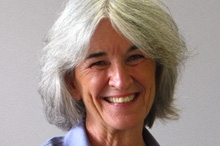The Stories Plants Can Tell: NEON’s Project BudBurst

Sandra Henderson is being honored as a Champion of Change for her dedication to increasing public engagement in science and science literacy.
Every plant has a story to tell. At my home in Erie, Colorado, I monitor a variety of plants including Common lilac, Quaking aspen, and Red columbine. Each morning feels like a little treasure hunt as I make my rounds to check out the plants! As one of the founders of NEON’s Project Budburst, I was able to combine my longtime experience in climate change education with my passion for plants. I am honored to accept this “Champion of Change” recognition on behalf of the Project BudBurst community and the legion of citizen scientists who are making a difference.
Project BudBurst was founded on the premise that every plant has a story to tell about our changing climates. We can empower people to better understand their surrounding ecosystems by actively engaging them in observing plants. Why are plants so important in understanding changing climates? Because plants are everywhere we live and they respond in predictable ways to changes in their environment -- variations in temperature, precipitation, and day length. If we take the time to observe them as “scientists,” we can learn a lot, not only about plants, but also about how the world around us works. Imagine if every person in the US ‘adopted a plant’ and reported the timing of leafing, flowering and fruiting on the Project BudBurst web site.
As the Director of Citizen Science at the NSF-funded National Ecological Observatory Network (NEON), I work with scientists, engineers, and educators who are very excited about continental-scale ecological data. NEON will provide 30 years of data on the effects of climate change, land-use change, and invasive species on natural resources and biodiversity. Project BudBurst participants complement the work done at NEON by encouraging people to go outside and make simple observations of plants; we essentially engage them as ‘human sensors.’ This continental-scale network of human sensors is helping to advance the frontiers of ecological science as well as increasing awareness of ecological processes and science in general.
It really does take a village to create and implement a national citizen science program. Making a continental-scale program relevant at the local level requires partnerships and collaborations with schools, universities, and other educational organizations. Project BudBurst has been working with staff and volunteers from agencies such as the US Fish and Wildlife Refuge System, the National Park Service, and botanic gardens, including the US Botanic Garden and the Chicago Botanic Garden. We are actively engaged in expanding our partner network to include museums and science centers. We are partners in the National Geographic Society’s FieldScope. To expand our participant base, we are now partnering with BioTracker to create a mobile app game called Floracaching – based on the popular geocaching activity but using plants as the ‘cache.’
One of the most exciting results of this program is that Project BudBurst data are being used by scientists! My friend and colleague, Kayri Havens-Young of the Chicago Botanic Garden, compared Project BudBurst data for 15 plants species to historical plant data from Chicago. Seven of the plant species had a first flower earlier in one or more of the last three years than had been seen during 1950-1994. In some cases, the first flower was several weeks earlier. These species included forsythia, spiderwort, dogtooth violet, red maple, may apple, common lilac, and black locust. Plants really do have a story to tell us about changes in the environment. With your help, we can collect more plant stories to better understand our changing environment.
Visit budburst.org to learn how to participate or become a partner.
Sandra Henderson is the Director of Citizen Science at the National Ecological Observatory Network (NEON).
White House Blogs
- The White House Blog
- Middle Class Task Force
- Council of Economic Advisers
- Council on Environmental Quality
- Council on Women and Girls
- Office of Intergovernmental Affairs
- Office of Management and Budget
- Office of Public Engagement
- Office of Science & Tech Policy
- Office of Urban Affairs
- Open Government
- Faith and Neighborhood Partnerships
- Social Innovation and Civic Participation
- US Trade Representative
- Office National Drug Control Policy
categories
- AIDS Policy
- Alaska
- Blueprint for an America Built to Last
- Budget
- Civil Rights
- Defense
- Disabilities
- Economy
- Education
- Energy and Environment
- Equal Pay
- Ethics
- Faith Based
- Fiscal Responsibility
- Foreign Policy
- Grab Bag
- Health Care
- Homeland Security
- Immigration
- Innovation Fellows
- Inside the White House
- Middle Class Security
- Open Government
- Poverty
- Rural
- Seniors and Social Security
- Service
- Social Innovation
- State of the Union
- Taxes
- Technology
- Urban Policy
- Veterans
- Violence Prevention
- White House Internships
- Women
- Working Families
- Additional Issues

